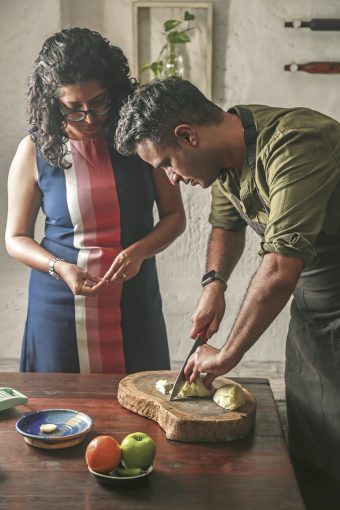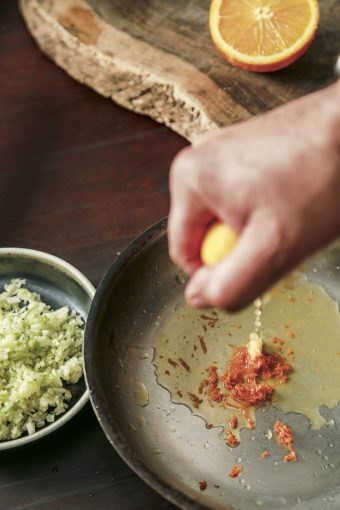
Rishim Sachdeva, Olive Bar & Kitchen’s former chef, made the hard decision to leave Mumbai where he had reached starry heights. Joanna Lobo gets the lowdown on his life and relationship with food between learning to prepare a dish of perfectly seared fish and quizzing him about the future. . .
PHOTOGRAPHED BY JOSHUA NAVALKAR
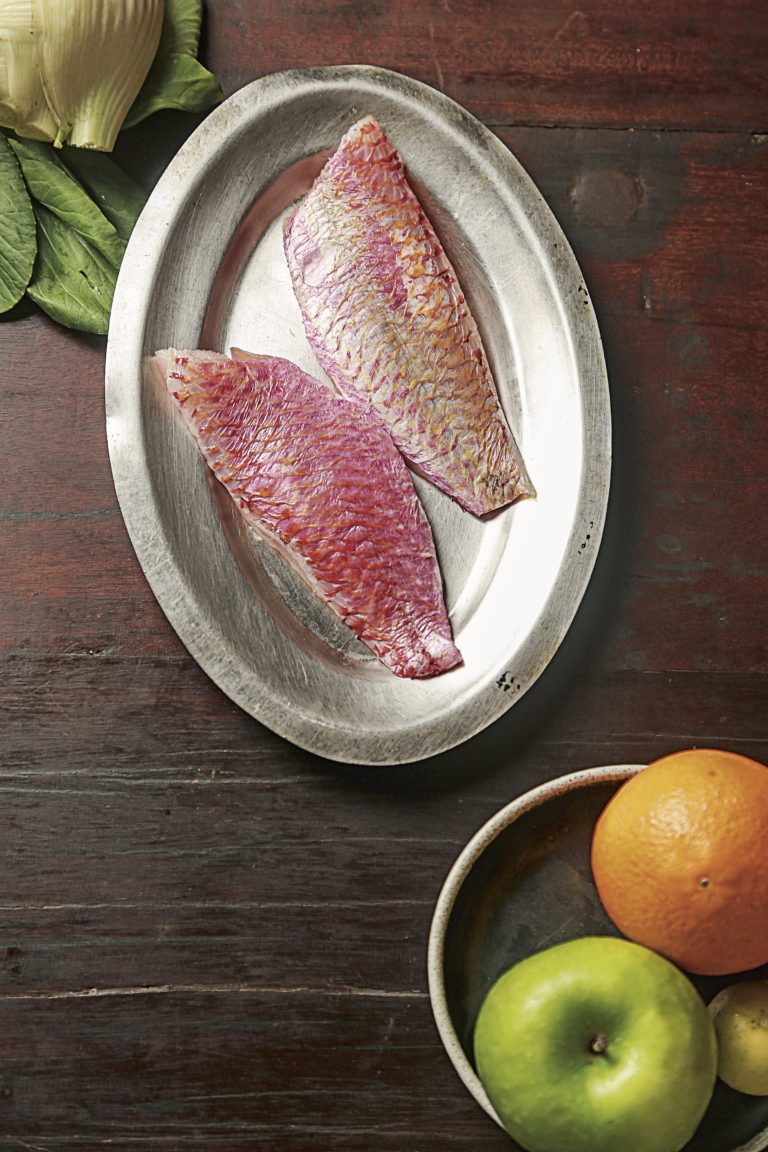
Mullet in the making
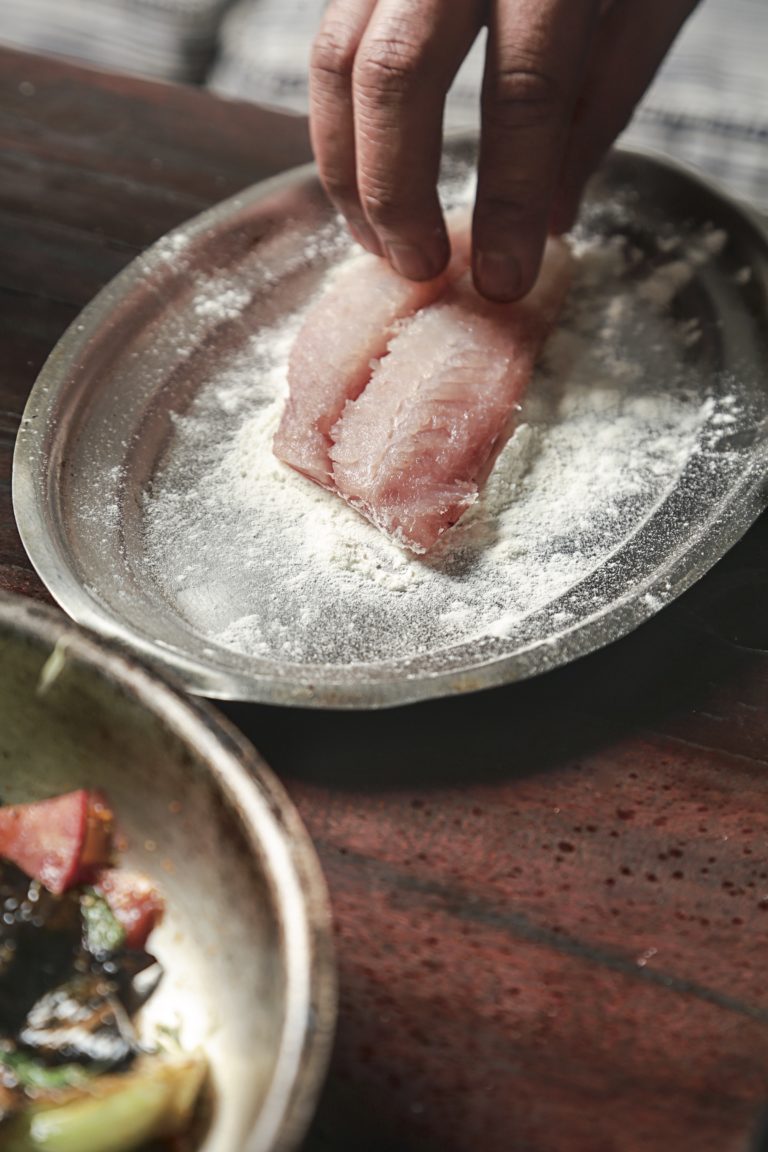
Mullet in the making
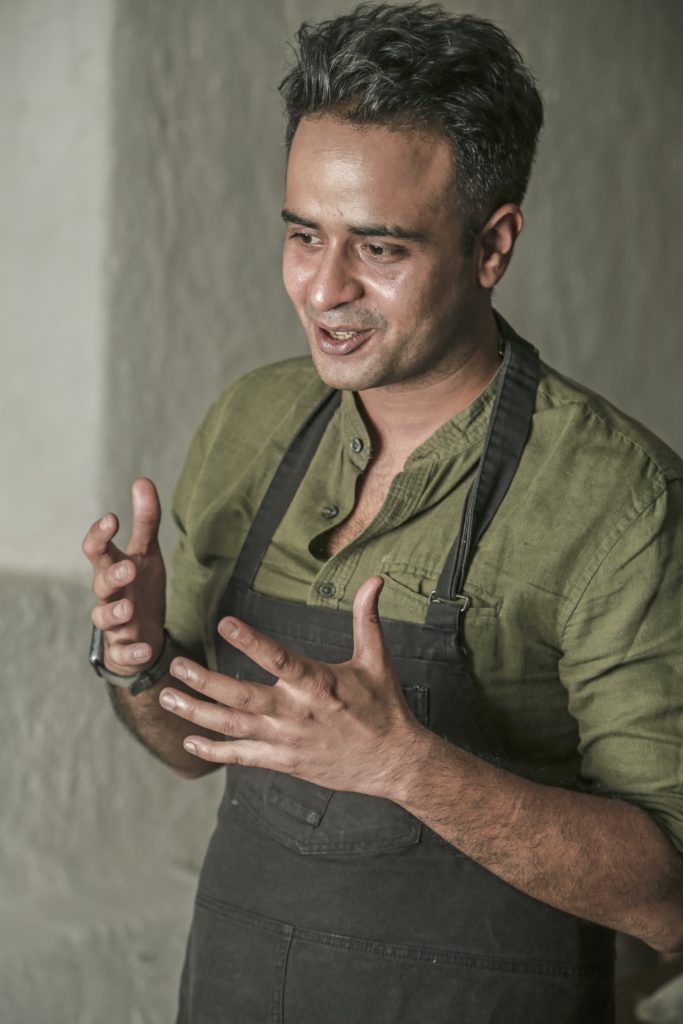
Chef Rishim Sachdeva
The call came at 1 a.m. Bollywood actor Shah Rukh Khan’s (SRK) New Year resolution was to learn how to cook, and he had one man in mind — Rishim Sachdeva, until recently the executive chef at Bandra’s Olive Bar & Kitchen in Mumbai. The next day, the ‘chosen one’ visited the star’s home armed with equipment and ingredients. The men made four dishes that session, including pasta from scratch. Nine months later, Sachdeva still gets sporadic messages or pictures of meals cooked at Mannat. They say it takes a star to recognise another….
After just four years at Olive, Sachdeva was being hailed as one of India’s top chefs. During his time there, he completely revolutionised the restaurant’s menu, bringing in new techniques, dishes and flavours. He became the champion of local produce and low-waste cooking. His food was modern, inventive and tasty, and his legendary brie on toast and tuna jerky, favourites at Olive, had the same power as SRK does to make people swoon. It came as a surprise then to industry watchers and diners that Sachdeva has made the difficult decision to leave Mumbai and move to his other home in London.
Innovation on a plate
Sachdeva, to use millennial-speak, ‘slayed it’ at Olive. It was a chance meeting with restaurateur AD Singh in London that brought a talented and raring-to-go chef to Mumbai in November of 2015. Olive had already made its mark on the city’s dining scene, offering up trusted and comforting Mediterranean fare — the Sunday brunches and Thursday dinners were hugely popular — and a legacy of exceptional chefs. “I thought there was room to do more,” he said. He had Singh’s support and a clientele that was well-travelled and open to experimentation. He was ready.
Slowly but effectively he introduced many changes. Some were basic: teaching the staff how to use flour properly, or the right way to cook fish when you have 30 covers a night. He also brought in innovative cooking methods and changed the service structure. His first menu came out in March 2016 featuring 70 per cent new items. Sachdeva worked with whatever was available, sourcing produce from the nearby Pali Market and adding in techniques like fermentation and smoking. “At the time, we were using a lot of imported ingredients. I wasn’t convinced about this because there is nothing unique about it. You know how asparagus will look on a plate. Where is the creativity and fun in that?”
Phone calls were made; chefs were consulted; there were visits to local farms and markets. He sourced fish locally and from Kochi or Ahmedabad. He began making his own sausages — an experiment with duck meat sold out within weeks of putting it on the menu. He aged meats and made his own pancetta, vinegars, sauces and ferments. Offerings Farms in Pune became a significant source of produce. Eventually there were 12 farms sending in deliveries, and the restaurant imported only salmon and pork. “I never felt the need to compromise on Indian produce. We were in a place where we could charge our guests a certain amount, and I believed that we should pay the farmers well. I never negotiated with them,” he says. Produce matters because “once you’ve tasted good stuff you cannot go back”. But, those who tasted Sachdeva’s food at Olive, always wanted to go back.
The first time I met him was in September last year while he was still at Olive. By then, Mumbai already had its pack of star chefs who were cooking good food and making waves online and at award ceremonies. Sachdeva was relatively unknown. At that first meeting, we spoke about the restaurant’s little kitchen garden where he was growing herbs, the good quality milk and cheese (aged to his specifications) sourced from across India, why food wastage matters and why red velvet cake doesn’t deserve the hate it gets. He backed up the talk with plate after plate of spectacular food — crunchy and juicy red velvet fried chicken, a zero-waste sweet corn gnocchi that used every part of the corn cob and a dish that championed the humble cauliflower, cauliflower and leek 2.0.
But it was always the baked brie and truffle or brie on toast for which he received the most attention, and deservedly so. The original dish was actually a dessert, sweeter and served on a raisin and walnut bread. The updated version was savoury, with raisin bread, truffle oil for umami, heaps of parmesan for saltiness and grated walnut.

Olive Bar & Kitchen
It remains a stunning example of how simple yet quality ingredients can produce great food. “Pairing different elements is an ongoing process. It takes a good two or three months to get the right dish out. Many happen by accident or out of necessity,” he says.
The desire to recreate beef jerky minus the beef (the meat isn’t served at Olive) led to experiments with sweet potato, salmon and tuna. Sachdeva’s popular tuna jerky was marinated with ginger, garlic and orange and cooked on low heat till dry. It was served rehydrated in a pan with the same marinade, some smoked honey, a touch of butter and smoked ketchup.
Though he came across as shy and incredibly modest on that day, throughout the meal, he was in and out of the kitchen, talking to guests, explaining his food philosophy and suggesting dishes. He was very hands-on in the kitchen, quite literally so. “I like the feel of ingredients,” he asserted. He didn’t follow a specific technique to plating. “If it tastes nice, it looks good.” His most trusted kitchen aid remains a particular, small and light, stainless steel teaspoon, without hard edges. “It’s been with me for 12 years.” His kitchen at Olive had at least 40 jars laden with ferments of fresh vegetables and fruits, mackerel, vinegars and pickles. He made sure that very little went to waste.
Planting a seed
The culinary industry has always been a part of Sachdeva’s life; his father (now retired) used to run a catering business and food was a hot topic for the Delhi family. At lunch, there were discussions about dinner. Pakoras were fried late at night for snacking on. Festival dinners were planned way in advance. Sundays were dedicated to roast chicken or lamb. “I was the only kid in the kitchen,” he says. He was cooking full-blown dinners at just 12 years of age. His first dish was an omelette, but he was soon making curries and roasts. Sachdeva’s mother was a “great cook”. He learned how to bake her favourite breads, puddings and brownies, her aloo mutter and traditional chicken roasts.
But, it was a simple apricot seed that set a young Sachdeva on the path to exploring ingredients. “My mum would pack fruits like apricots in our lunch boxes. I remember sitting at my school desk after eating one and wondering about the seed, trying to chew it and break it down. While the fruit was sweet, the seed tasted bitter. It was unexpected because I didn’t expect the fruit to have any other flavour,” he says. Even today, eating an apricot is an instant portal into the past. It’s also why he is partial to bitter notes and ensures there is always some element of it in his cooking. “The relationship with food and the curiosity was always there. It still is,” he maintains.
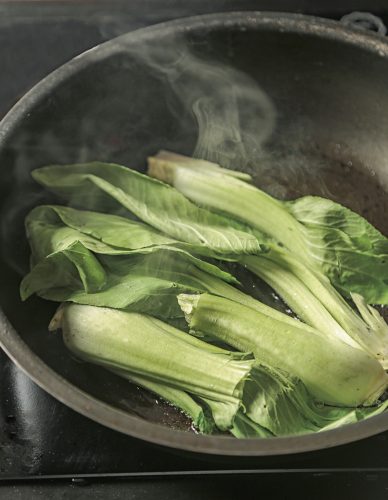
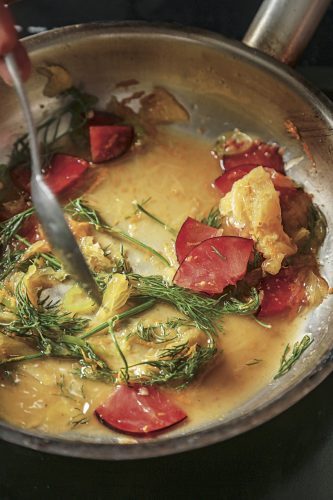
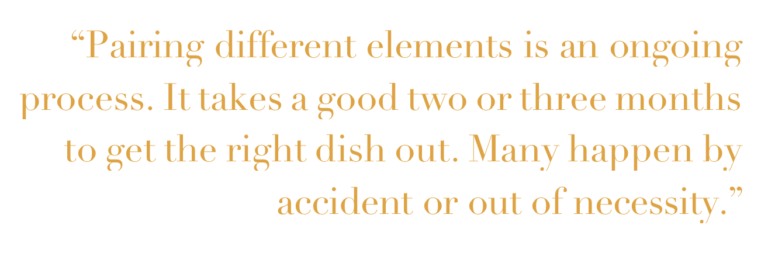

Plum, orange and serrano glazed mullet with charred pok choy, mushroom and walnut fennel tapenade.
When he was 16, his family moved from Delhi to London. Sachdeva studied hospitality and tourism at Brookes University, Oxford. It was good times for the teenager. “I lived away from family for the first time and student housing was liberating. I drank one too many vodka-Redbulls and still managed to pass!” he jokes.
When it came time for interning, he knew that he wanted to focus on techniques. “I was influenced by French food because it is the base of cooking and its techniques are so well-documented.” So, he walked straight into Marco Pierre White’s The Oak Room in London, got himself an interview and an internship. He started out as a dishwasher, moved to prep, oversaw deliveries and worked in the salad section. When his internship ended, he got a job as chef de partie working the meat section, then fish and sauces. Two-and-a-half years later, Sachdeva walked out of there with experience, honed skills and a fair bit of arrogance. A series of rejections followed, bringing his attitude down a notch.
Sachdeva had his heart set on Fat Duck, in Berkshire. He was rejected 18 times over the course of the next two-and-a-half years. When he finally got in, it was for an internship that didn’t pay. But, six months later, he was promoted to chef de partie. “After two years, I realised this was not my calling. I loved the food and have immense respect for Heston [Blumenthal], but I wanted to do something different. I knew I was technically sound but wanted to try focusing on produce and exploring ingredients,” he says. The ‘something different’ turned out to be Almeida Restaurant & Bar, London. The restaurant works with a lot of farms, fresh seasonal produce and has a menu that changes often. That’s where Sachdeva began his love affair with preserves and ferments, what he calls “a whole new world of flavour”.
Every restaurant has offered him a learning experience. A three-and-a-half-year stint at the Virgin Atlantic Clubhouse at Heathrow Airport taught him about the costing side of the business and working with tight budgets. At Chiltern Firehouse in London, he learned the value of clean eating. In Delhi, at Uzuri (modern European with African elements), he realised that while he didn’t like the city, he wanted to work with Indian produce. Uzuri, however, gave him two things of value: AD Singh tasted his cooking, and it was here that he met his (now) wife, Pakshalika.
Home and away
If not in the kitchen, Sachdeva may be found at home. He loves watching movies or cooking shows and reading. The late celebrity chef and author Anthony Bourdain is a favourite; the search for his book Kitchen Confidential is how he and Pakshalika (who works in publishing) became friends. Their vacations are long and they enjoy living like locals when they travel, eating ‘crazy’ food like duck embryos in the Philippines or bug burgers in Cambodia.
Olive, thanks to Sachdeva’s prowess in the kitchen, became a stronger brand. Most comfortable at the stove, he enjoyed showing people how to use ingredients and create tasty food. He was focussed on being a good mentor to his staff, just like White and Blumenthal had been to him. Though unassuming, he took on a different personality in the kitchen. “We shared a lot in there. In fact, I knew about all the dates my boys got to on Tinder!” And, if asked nicely (like SRK did), he would hold a personal masterclass (rarely). As for me, I got to learn the process of making a plum, orange and serrano glazed mullet with charred pok choy, mushroom and walnut fennel tapenade. The dish is a mouthful and requires a fair bit of work. The pok choy, apples and plums have to be sliced, walnuts chopped, fish seared till the skin is crisp, the tapenade mixed together and finally, everything brought together beautifully in a bowl. It’s a treat to watch him work, wielding a knife with ease, creating perfectly identical slices and plating each ingredient with precision. The faithful spoon made many appearances. I also got to sample the pickles and ferments on his shelves, ripe plums, tart carrots and dehydrated bombil. It’s a feast for the taste buds.
A feast now for the eyes as well — Sachdeva made his TV debut in July, demonstrating how to cook healthy food. “Before going on TV I had to ask myself why I wanted to do it, what I had to offer, whether I had the knowledge…or that perfect dish. I don’t think I have all the answers,” he says.
Sachdeva, at the moment, is living his best life. He just became a father to a baby boy called Shaiel, affectionately nicknamed Yuzu. He chose to move to London because he wants to be closer to his family and bring his son up there. These days, he is spending as much time as he can with Yuzu, and in between the hectic schedule and sleepless nights that come with a newborn, he is also finding the time to continue on his food journey. He is busy with some consulting and is working on something ‘big’. “I am doing my style of food, using a lot of Indian techniques, produce and preservation processes. But, it won’t be Indian food.”
He doesn’t want to talk about it, preferring to share more once he has perfected things. It is this same caution that had kept him from jumping into opening his own place — a dream he has had since he was 16. “I needed the right reasons to open a restaurant. I also needed to see if I am a good businessman. To open a restaurant, the whole package has to be right. How responsible do you feel towards suppliers? What are your priorities? And, you need to have confidence in your food,” he says.
“As for me, I know I can make even corn husk sexy.”

